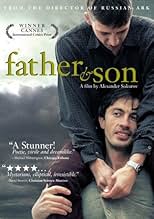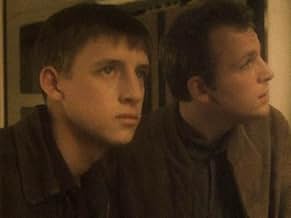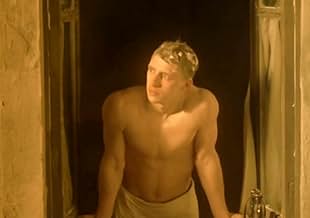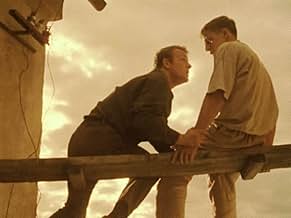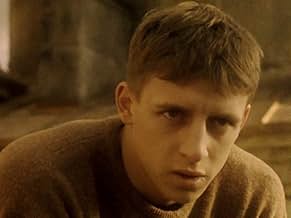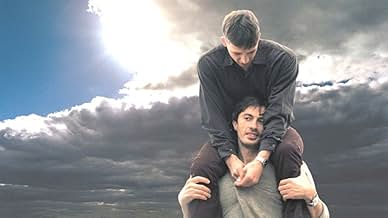CALIFICACIÓN DE IMDb
6.5/10
2.7 k
TU CALIFICACIÓN
Un padre y su hijo viven juntos en un apartamento. Llevan años viviendo solos en su propio mundo privado, lleno de recuerdos y ritos cotidianos. A veces parecen hermanos. A veces incluso ama... Leer todoUn padre y su hijo viven juntos en un apartamento. Llevan años viviendo solos en su propio mundo privado, lleno de recuerdos y ritos cotidianos. A veces parecen hermanos. A veces incluso amantes.Un padre y su hijo viven juntos en un apartamento. Llevan años viviendo solos en su propio mundo privado, lleno de recuerdos y ritos cotidianos. A veces parecen hermanos. A veces incluso amantes.
- Dirección
- Guionista
- Elenco
- Premios
- 2 premios ganados y 1 nominación en total
- Dirección
- Guionista
- Todo el elenco y el equipo
- Producción, taquilla y más en IMDbPro
Opiniones destacadas
Alexander Sokurov's Mother and Son had a sense of joy and love tempered by a setting in an ominous dark forest. The second part of the trilogy, Father and Son has no such ambivalence. It is drenched in sunlight and bathed in a glow of greens and browns. The film opens with the image of two male bodies in bed, their naked bodies intertwined in a rapturous embrace. One is breathing rapidly; the other is trying to comfort him. We think these must be gay lovers, but soon discover that it is a father comforting his son after a nightmare. Though the film feels homoerotic, Sokurov chafed at the suggestion calling it the product of sick European minds. According to the director, "Their (father and son) love is almost of mythological virtue and scale. It cannot happen in real life", and the film is "the incarnation of a fairy tale. Shot in Lisbon, Portugal, Father and Son is not attached to time or place. A soldier's uniform is depicted in the latest style, while women's dresses and hairstyles are of the 40s, 50s and 60s.
Father (Andrei Shetinin) and son (Alexei Nejmyshev) live together on the top floor of an apartment house and have done so for many years since the death of their mother. Their world looks like a sanctuary but may be a prison. It was while attending a school for air cadets that the father met his wife and bore his son, now 20. His son's physical appearance reminds the father of his late wife and their bond is intense and emotional. Alexei attends military school like his father who left military service against his will and wants his son to pick up where he left off. He has a girl friend but there is a distance between them. She is jealous of his relationship with his father that to her appears overprotective and he does not want to give up his father's closeness.
Alexei's father is conflicted about looking for a job in a different city and seeking a new wife. They must decide whether to continue their lives together or independently. The struggle for freedom and independence is mutual but they are held together by a transcendent love. Father and Son is an enigmatic but deeply poetic film about the complex bond that a son has with his father. While the film is open to interpretation from different cultural, psychological, or religious points of view (the film says, `A father who loves his son crucifies him. A son who loves his father sacrifices himself for him'), for me, the best approach is to avoid the temptation to analyze and just bathe in the warmth of its loving glow.
Father (Andrei Shetinin) and son (Alexei Nejmyshev) live together on the top floor of an apartment house and have done so for many years since the death of their mother. Their world looks like a sanctuary but may be a prison. It was while attending a school for air cadets that the father met his wife and bore his son, now 20. His son's physical appearance reminds the father of his late wife and their bond is intense and emotional. Alexei attends military school like his father who left military service against his will and wants his son to pick up where he left off. He has a girl friend but there is a distance between them. She is jealous of his relationship with his father that to her appears overprotective and he does not want to give up his father's closeness.
Alexei's father is conflicted about looking for a job in a different city and seeking a new wife. They must decide whether to continue their lives together or independently. The struggle for freedom and independence is mutual but they are held together by a transcendent love. Father and Son is an enigmatic but deeply poetic film about the complex bond that a son has with his father. While the film is open to interpretation from different cultural, psychological, or religious points of view (the film says, `A father who loves his son crucifies him. A son who loves his father sacrifices himself for him'), for me, the best approach is to avoid the temptation to analyze and just bathe in the warmth of its loving glow.
Time has passed before seeing a film that was so heart warming and involving. I have ever loved slow and sometimes annoying movies. But for some reason I wasn't intrigued by the genre anymore (just know one of my favorite is 'Aliens''86).
I started watching it and I felt so charmed by it all. The story is practically inexistent but you won't mind.The visual aspect and how things are going in this lovely and simple way can't let you indifferent.
As some others said it is although sensual and homo erotic. Such a relationship between father and son is almost unthinkable but not impossible. This in fact is not that important seen the poor story 'content'.
If you watch this movie in a relaxed way you will feel very good in the end, especially if you're not going with the idea of expecting great things.
I started watching it and I felt so charmed by it all. The story is practically inexistent but you won't mind.The visual aspect and how things are going in this lovely and simple way can't let you indifferent.
As some others said it is although sensual and homo erotic. Such a relationship between father and son is almost unthinkable but not impossible. This in fact is not that important seen the poor story 'content'.
If you watch this movie in a relaxed way you will feel very good in the end, especially if you're not going with the idea of expecting great things.
Alexandr (Russian Ark) Sokorov's Father and Son (Otets y sin) wow! What a beautiful, dreamlike, homoerotic film, and also what a wildly self-indulgent one! A beefy man (Andrei Schetinin), a soldier, we're told, who smiles a lot and looks like Farley Granger (his acting seems to consist mostly of smiling), has a son, Aleksei (Aleksei Neymyshev), who looks like his younger brother but has broader shoulders and an even more spectacularly defined body, and who is studying medicine in military school. The classes seem to consist of manly tussling in camouflage gear. The film begins with a manly tussle -- of son and dad, naked in a bed, filmed abstractly, showing only parts of the body in grainy low light, like the lovemaking scene of the French model and the Japanese architect in the sand at the opening of Resnais' Hiroshima mon amour. Everything in Father and Son is seen in soft focus through a pale amber/gold filter. Everything is beautiful and unreal.
The director has declared himself shocked and irritated by our feeling that the content is homoerotic, and therefore incestuous. There are cultural differences here: one remembers the Russian soldiers in Cartier-Bresson's Fifties photo holding hands in a museum. Americans are over-touchy about homoeroticism, none the less so if they're gay, and one can't question Sokorov's assertion that for him, this is a poem about parental relationships along male lines, about the son's need to break away on his own and become a man, and nothing at all about the homoerotic. The beautiful tussling bodies and the two almost clone-like men are meant innocently as ways of showing intimacy poetically and visually.
Sokorov is an avantgardist, and it's perhaps a bit of an accident that his previous film, Russian Ark, became so wildly popular with the non-Russian art house crowd. Somehow the technical feat of the single take and the variety, color, and prettiness of the images endlessly unfolding in Russian Ark rendered it more palatable to a general audience than usual. His stylistic methods generally demand great patience and openness from an audience. But Father and Son grows on one. It may seem bland, boring, incomprehensible at first, but eventually, if you let it, if you absorb its language and give in to its mood, it works its magic. The movie also has a timeless quality. It may evoke Eisenstein or Cocteau. Its Lisbon setting, also magical, is nowhere and everywhere, a place of the imagination that could be Russia, or Europe, or Baltimore in the Fifties.
Father and son apparently have lived together in a certain isolation for a long time. Sokorov creates his own space. Out of the dark apartments the men leap across a board onto the adjoining roof, where a friend of the son also comes out. The men jump on the board with athletic abandon. They could be gymnasts or ballet dancers, so great is their agility. There's also something incredibly manly about their voices as they talk in low voices in the Russian tongue (which I don't know at all); this effect also was created in Vozvrashchnenie (The Return, by Andrei Zvyagintsev), another recent Russian film that had its own unique mood and look. You walk out of the theater listening to American voices and they sound squeaky and puerile. It's not so important what they're saying; the literal meaning isn't significant. It's a kind of music, and it's accompanied by a muted soundtrack of classical music by Sergei Moshkov that works another kind of suble spell with its hints and portents. (The sound track is unique.) This could be a silent film. The focus is intensely on the visual. The cinematography by Aleksandr Burov is beautiful.
There is a sequence of scenes, but very little that can be described as a story line. There's a neighbor and friend of Aleksei's, Sasha (Aleksandr Razbash), whose father has disappeared (a rhyming and contrasting subplot). He and Aleksei (the son) go down into town and take a long tram ride. In this uneventful film, that tram ride is a big deal: it's the main event, in a way, and the dreamlike, gorgeous photography gives the ride an unforgettable quality. Aleksei and his friend, and Aleksei and his father, stand so close together you think they're going to kiss each other. There's lots of manly affection here: it really is manly, even if it takes you a while to grasp that. Aleksei also has a girlfriend and he breaks up with her because she has acquired a mysterious older boyfriend, although he has just dreamed of their having a child. Abstractly, in these details, the idea of fatherhood and of the intervention of a father in the life of a son are alluded to.
The girlfriend is a bit unworthy in this macho film. She seems a pinched little girl like a beggar in a Charlie Chaplin movie.
These details can only be sketched in because that's the way they are. When one sees Father and Son one realizes that the plotlessness of Russian Ark wasn't specific to that `story,' but Sokorov's usual modus operandi.
The pretty homoerotic sequences in Father and Son recall Derek Jarman's arty and lovely but repetitive dramatizations of Shakespeare's male-love sonnets in The Angelic Conversation(1985) -- except here there is no textual basis, so the movie's relatively rudderless, but also flows from sequence to sequence more seamlessly. Though the message, if any, is that father-son love is a wonderful thing, there's also the son's fatalistic remark, ''A father's love crucifies, and a loyal son accepts crucifixion.''
It's hard to tell at times if Sokorov's film is a big snooze or a beautiful reverie. Due to the plotlessness and the glacial pace, this can hardly be expected to catch on with mainstream audiences. Father in Son is best appreciated not as a narrative but a visual poem. It takes you into another world -- a world you may find alien and yet not want to leave.
This is part of a trilogy. There has been Mother and Son, now this, and there will be Two Brothers and a Sister.
The director has declared himself shocked and irritated by our feeling that the content is homoerotic, and therefore incestuous. There are cultural differences here: one remembers the Russian soldiers in Cartier-Bresson's Fifties photo holding hands in a museum. Americans are over-touchy about homoeroticism, none the less so if they're gay, and one can't question Sokorov's assertion that for him, this is a poem about parental relationships along male lines, about the son's need to break away on his own and become a man, and nothing at all about the homoerotic. The beautiful tussling bodies and the two almost clone-like men are meant innocently as ways of showing intimacy poetically and visually.
Sokorov is an avantgardist, and it's perhaps a bit of an accident that his previous film, Russian Ark, became so wildly popular with the non-Russian art house crowd. Somehow the technical feat of the single take and the variety, color, and prettiness of the images endlessly unfolding in Russian Ark rendered it more palatable to a general audience than usual. His stylistic methods generally demand great patience and openness from an audience. But Father and Son grows on one. It may seem bland, boring, incomprehensible at first, but eventually, if you let it, if you absorb its language and give in to its mood, it works its magic. The movie also has a timeless quality. It may evoke Eisenstein or Cocteau. Its Lisbon setting, also magical, is nowhere and everywhere, a place of the imagination that could be Russia, or Europe, or Baltimore in the Fifties.
Father and son apparently have lived together in a certain isolation for a long time. Sokorov creates his own space. Out of the dark apartments the men leap across a board onto the adjoining roof, where a friend of the son also comes out. The men jump on the board with athletic abandon. They could be gymnasts or ballet dancers, so great is their agility. There's also something incredibly manly about their voices as they talk in low voices in the Russian tongue (which I don't know at all); this effect also was created in Vozvrashchnenie (The Return, by Andrei Zvyagintsev), another recent Russian film that had its own unique mood and look. You walk out of the theater listening to American voices and they sound squeaky and puerile. It's not so important what they're saying; the literal meaning isn't significant. It's a kind of music, and it's accompanied by a muted soundtrack of classical music by Sergei Moshkov that works another kind of suble spell with its hints and portents. (The sound track is unique.) This could be a silent film. The focus is intensely on the visual. The cinematography by Aleksandr Burov is beautiful.
There is a sequence of scenes, but very little that can be described as a story line. There's a neighbor and friend of Aleksei's, Sasha (Aleksandr Razbash), whose father has disappeared (a rhyming and contrasting subplot). He and Aleksei (the son) go down into town and take a long tram ride. In this uneventful film, that tram ride is a big deal: it's the main event, in a way, and the dreamlike, gorgeous photography gives the ride an unforgettable quality. Aleksei and his friend, and Aleksei and his father, stand so close together you think they're going to kiss each other. There's lots of manly affection here: it really is manly, even if it takes you a while to grasp that. Aleksei also has a girlfriend and he breaks up with her because she has acquired a mysterious older boyfriend, although he has just dreamed of their having a child. Abstractly, in these details, the idea of fatherhood and of the intervention of a father in the life of a son are alluded to.
The girlfriend is a bit unworthy in this macho film. She seems a pinched little girl like a beggar in a Charlie Chaplin movie.
These details can only be sketched in because that's the way they are. When one sees Father and Son one realizes that the plotlessness of Russian Ark wasn't specific to that `story,' but Sokorov's usual modus operandi.
The pretty homoerotic sequences in Father and Son recall Derek Jarman's arty and lovely but repetitive dramatizations of Shakespeare's male-love sonnets in The Angelic Conversation(1985) -- except here there is no textual basis, so the movie's relatively rudderless, but also flows from sequence to sequence more seamlessly. Though the message, if any, is that father-son love is a wonderful thing, there's also the son's fatalistic remark, ''A father's love crucifies, and a loyal son accepts crucifixion.''
It's hard to tell at times if Sokorov's film is a big snooze or a beautiful reverie. Due to the plotlessness and the glacial pace, this can hardly be expected to catch on with mainstream audiences. Father in Son is best appreciated not as a narrative but a visual poem. It takes you into another world -- a world you may find alien and yet not want to leave.
This is part of a trilogy. There has been Mother and Son, now this, and there will be Two Brothers and a Sister.
Maybe if I had seen the first film in director Aleksandr Sokurov's trilogy, "Mother and Son," then "Father and Son (Otets i syn)" as Part 2 would have made some sense.
Instead, I found the beautiful imagery contradicting the limited dialogue. The camera loves the two lead actors to the extent that I simply could not figure out if paternal love was crossing over into incest or just homo-eroticism.
Andrei Shchetinin is one handsome, presumably widowed father and he spends a lot of time shirtless and working out. Aleksei Nejmyshev as his 20 year old son has mesmerizing blue eyes who understandably makes his possibly current or ex girlfriend weak in the knees by his penetrating stare.
And that's about all that happens.
The lead characters and their male friends spend a lot of time urgently telling each other they need to talk and then staring into space, or down at their shoes, or at each other. They do kick around a ball like such a pair would in American films, but they don't even talk about sports as a substitute for real interchange.
I was sorely reminded of Andy Warhol films, let alone satires of Ingmar Bergman films, but the cinematography was warm and lovely.
At least I got to see some of St. Petersburg and Lisbon, which I think is standing in for parts of St. Petersburg, while they are wandering around emoting and inarticulate. (At least all the final credits were in English.)
The intensity of the central relationship is shown very effectively as they enter each other's dreams, but the repeated parables about father's and son's roles in crucifixion sounded pithier than was demonstrated metaphorically.
Instead, I found the beautiful imagery contradicting the limited dialogue. The camera loves the two lead actors to the extent that I simply could not figure out if paternal love was crossing over into incest or just homo-eroticism.
Andrei Shchetinin is one handsome, presumably widowed father and he spends a lot of time shirtless and working out. Aleksei Nejmyshev as his 20 year old son has mesmerizing blue eyes who understandably makes his possibly current or ex girlfriend weak in the knees by his penetrating stare.
And that's about all that happens.
The lead characters and their male friends spend a lot of time urgently telling each other they need to talk and then staring into space, or down at their shoes, or at each other. They do kick around a ball like such a pair would in American films, but they don't even talk about sports as a substitute for real interchange.
I was sorely reminded of Andy Warhol films, let alone satires of Ingmar Bergman films, but the cinematography was warm and lovely.
At least I got to see some of St. Petersburg and Lisbon, which I think is standing in for parts of St. Petersburg, while they are wandering around emoting and inarticulate. (At least all the final credits were in English.)
The intensity of the central relationship is shown very effectively as they enter each other's dreams, but the repeated parables about father's and son's roles in crucifixion sounded pithier than was demonstrated metaphorically.
Father and Son is a film about a special relationship. one who has not explanations, definitions or a precise form. one who remains, always, out of words. so, the work of Sokurov is more than admirable. because he propose a translation of so personal links that only a father and a son could understand the reality beyond the images. like each translation, the film is far to be perfect. maybe for the sin to be too abstract or too sentimental or to direct, or too poetic. in fact it is only a honest confession. about a special form of love. about duty. about solitude. about looking of fundamental answers for become yourself. a film about past. about ages. about meaning of life. about the best manner to discover the other as part of yourself and as different man. this is all. the homoerotic references, the army, the ambiguity of relation
¿Sabías que…?
- TriviaFilm debut of Aleksei Neymyshev.
- ConexionesFeatured in Sokurovin ääni (2014)
Selecciones populares
Inicia sesión para calificar y agrega a la lista de videos para obtener recomendaciones personalizadas
- How long is Father and Son?Con tecnología de Alexa
Detalles
Taquilla
- Total en EE. UU. y Canadá
- USD 39,291
- Fin de semana de estreno en EE. UU. y Canadá
- USD 4,541
- 20 jun 2004
- Total a nivel mundial
- USD 73,351
Contribuir a esta página
Sugiere una edición o agrega el contenido que falta


